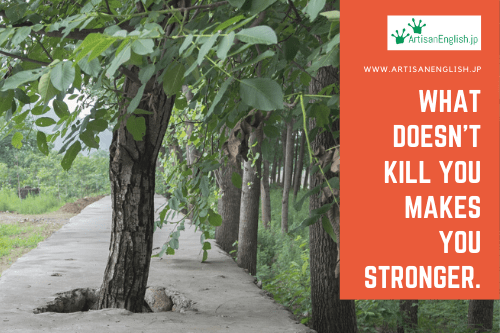
possibly a more daunting challenge.
(Photo: michaelqiao13591/Pixabay | Text: David/ArtisanEnglish.jp)
YouTube / iTunes / Spotify / Radio Public / Pocket Casts / Google Podcasts / Breaker / Overcast
Listen to ArtisanEnglish.jp posts & lesson intros here.
Phrase: What doesn’t kill you makes you stronger
Embrace hardship and difficulty.
Do that, and you will build up your strength and endurance for the next, possibly more daunting challenge.
In a nutshell, that’s what Friedrich Nietzsche said. He was a smart guy, you know.
Of course, he didn’t know everything, and he did have some faults, but there is some truth in what he said.
We have all survived through hard times.
Some of us have had a rougher time than others, but we are all here now, and we are all stronger for it.
I read every day about how people experience mental and physical breakdowns due to our collective coronavirus experience.
Some politicians have likened it to a war with the virus as our enemy.
I don’t look at it that way.
Our worst enemy in this situation is ourselves.
The Gen X, millennial and now Gen Y generations have already experienced hard times, and most of us have survived.
Now, we have to draw on the strengths we built up during those times and use them to drag our asses through what may become the coronavirus era.
Heck, the entire world has made it through four years of Trump.
That alone proves what doesn’t kill you makes you stronger.
Some Americans who thrive on, I have no idea what you call it, even want four more! I also have no idea what you call that.
Don’t moan or complain about the trials, tribulations and hardships you face.
When we get through it, we’ll be better off because what doesn’t kill you makes you stronger.
At least, that’s what Nietzsche said, and he was a pretty smart man.
Flesch-Kincaid Readability Test
This post is understandable by someone with at least a 7th-grade education (age 12).
On the Flesch-Kincaid reading-ease test, this post scores 78.
The easier a passage is to read, the higher the score on a scale of 0 – 100.

